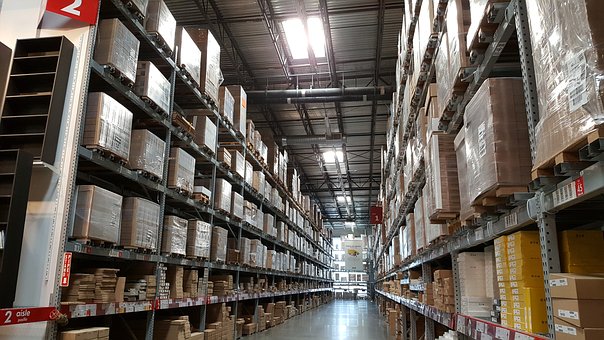Storage units can prove to be highly advantageous in various scenarios, such as downsizing to a smaller living space where not all possessions can be accommodated, transitioning between homes where a temporary storage solution is required, or during extended periods of absence from the country where rental expenses can be avoided.
Perhaps you have a big memorabilia collection that takes up too much of your living space. Or maybe you don’t have enough room for your hobby equipment. You can see there are many reasons why people rent storage units. And there are also many different types of storage solutions. If you are wondering which one is the right for you, read on.
Types of Storage Offered by Movers
This is the kind of storage owned by moving companies, intended to facilitate their clients’ storage needs. Not all moving companies offer this service, though. If you opt for moving company type of storage you can be sure your belongings are handled with great care and professionalism.
How does it work? Moving crew comes to your home, packs your things gently and efficiently, loads it on to the truck and then unloads it into the storage unit. Depending on your needs, storage professionals can provide you with various types of storage facilities.
Outdoor Storage

The majority of storage facilities available in the market are outdoor storage facilities, which implies that the storage units are situated outside and are susceptible to various weather conditions, including extreme high and low temperatures. Therefore, it is imperative to exercise caution while selecting items to be stored in such facilities. It is advisable to store temperature-sensitive items in an indoor storage unit equipped with climate control to ensure their safety and longevity.
But, the advantage of outdoor storage is its size. They are usually bigger than indoor units and can fit more items. They are perfect for sporting equipment, seasonal decorations, and large furniture. Even cars or boats can fit in an outdoor storage unit.
Indoor Storage
Storage units of this kind are recommended when you need to store sensitive items. Indoor storage is protected from outside weather conditions because it has air conditioning. AC is necessary to control temperature, moisture, and humidity – all three can damage your possessions to a different extent. You should choose it when storing the following:
- Antique and wooden furniture – these items can crack or split when left in extremely hot and extremely cold temperatures.
- Photographs – they can fade out or become yellow if not properly climatized.
- Personal or business documents – if you don’t want your valuable documents to become yellow or illegible you will need a type of storage with air conditioning.
- Furs – these are very sensitive to heath.
- Electronics and appliances – these items don’t react well to shifts in temperature, so they need to be kept in a climate-controlled environment.
- Artwork and arts and crafts supplies – none of these items benefit from temperatures changes and can be seriously damaged if left without AC.
- Musical instruments – although they can be large and difficult to move, like for example pianos, all musical instruments need to be stored in climate-controlled conditions. Strings on a guitar or a piano can rust if left in a humid environment. Also, glue can lose its adhesive power when it’s really hot outside.
- Special collections – proud owners of collectible items need an indoor storage for their items. Comics and stamps require constant temperature and humidity levels in order not to lose their value. When coins are in a humid environment, they rust.

If you live in the city of New York, which has temperatures at both ends of the thermometer, you should really think about this type of storage solution when storing the aforementioned items. High-quality movers and storage NYC company will make sure to conserve your belonging in ideal conditions.
Short-term Storage
Both indoor and outdoor storage options are available for short-term rental, which is particularly convenient during transitional periods between residences. Short-term storage units are suitable for holding belongings for less than a year and can vary in size depending on individual requirements.
Long-term Storage
If your attic has reached its maximum capacity, it may be prudent to consider long-term storage options. This is particularly useful if you require a secure location to store valuable items, such as an old-timer bike that requires restoration. Long-term storage provides an effective solution for decluttering your home while retaining possession of cherished possessions. Additionally, prepaying annual fees for long-term storage often results in discounted rates.

The biggest perk of moving company storage is that they offer high levels of security and privacy. Their downside is that you can’t access your unit anytime, but need to make an appointment. This is not the case whit this movers and storage in NYC company. They guarantee unlimited access to users while keeping intruders away and maintaining high levels of security.
Self-Storage Facilities
An alternative to a moving company storage facility is a self-storage facility. These are more affordable but lack the perks offered by moving company storage. If you go to a self-storage facility you will have to pack your things yourself. The difficult task of carrying bulky possessions will be yours alone. These also, in most cases, offer the choice of indoor and outdoor units. You can decide if you want climate control or not. The upside of self-storage units is unlimited access to your unit. You can drive up there anytime, day or night, without prior notification.
These are the types of storage units available – moving company storage and self-storage. Each with its set of upsides and downsides. It’s up to you to decide what is a priority at a given time. And don’t forget about the nature of things you are storing. No point of storing them, if you don’t ensure ideal conditions.
